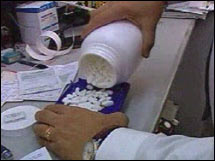|
Bristol could get PR boost from AIDS drug Partnering with Merck, Gilead on combo HIV treatment that some believe will be a blockbuster. NEW YORK (CNNMoney.com) -- Bristol-Myers Squibb could gain a badly needed boost to its public image with a new AIDS drug that analysts are calling a potential billion-dollar blockbuster. On Monday, Bristol-Myers and two partners filed an application with European regulators to get Atripla, a combination treatment for HIV, approved in the European Union. Atripla was approved by the Food and Drug Administration on July 12, and is available in the United States.
The once-a-day pill is a combination of drugs from Bristol-Myers (down $0.04 to $24.34, Charts), based in Madison, N.J., Merck & Co., (down $0.09 to $41.77, Charts) based in Whitehouse Station, N.J., and Gilead Sciences (down $0.76 to $64.42, Charts), a San Francisco-based biotech. If approved by the EU, the pharmaceutical trio would base the Atripla launch in Ireland, with the companies divvying up marketing throughout Europe. Annual sales could easily reach blockbuster status for the HIV treatment, analysts say, with the revenue split among the three drugmakers. Atripla's annual U.S. sales are expected to total $82 million this year but would blossom to $1.8 billion in 2011, said Philip Nadeau, analyst for Cowen and Co. Nadeau said the drug's sales would be bolstered by the established reputation of its ingredients. The drugs that make up the Atripla combo - Gilead's Truvada, and the drug efavirenz, known as Sustiva when produced by Bristol and Stocrin when produced by Merck - are established products that garner hundreds of millions of dollars in annual sales. In the first half of 2006, Truvada sales totaled $548 million, Sustiva totaled $368 million and sales of Stocrin - which are lumped together on the balance sheet with Merck's AIDS drug Crixivan - totaled $156 million. "Truvada and Sustiva are today the standard of care drugs for patients who are newly diagnosed with HIV," said Nadeau. But muting Atripla's impact for Bristol and Gilead would be its competition with the more established drugs, Sustiva and Truvada. Many of the major drugmakers compete in the multibillion-dollar HIV drug market, including GlaxoSmithKline (down $0.24 to $54.09, Charts), Sanofi-Aventis (down $0.29 to $43.30, Charts) and Abbott Labs (down $0.62 to $46.08, Charts), as well as Orasure Technologies (down $0.09 to $7.84, Charts), which produces an HIV test. But the HIV market is not a thriving moneymaker like the massive American industries for heart disease and cancer. Most of the HIV drug revenue comes from patients in the comparatively rich markets of the U.S. and Europe. But some two-thirds of the approximately 40 million AIDS patients worldwide live in sub-Saharan Africa, and many of them are too poor to afford the drugs they need. As a result, many of the pharmaceutical companies give the drugs away for free or sell them at reduced prices. For example, Merck sells Stocrin and Crixivan at a reduced price to some 500,000 patients in 76 developing nations. Regardless of sales, Atripla could provide a valuable tool to Bristol-Myers in improving its image in the eyes of the public and investors. Bristol-Myers recently ousted CEO Peter Dolan after suffering a number of setbacks during his five-year tenure, and the company could use a good facelift to improve its reputation. Making AIDS drugs available to poverty-stricken patients could go a long way in helping Bristol reinvent its image. Also, the company could win the favor of investors by hitching itself to a scandal-free partner such as Gilead, which has seen its stock price surge more than 40 percent over the last 12 months. "I think Bristol will benefit from being [near] Gilead's virtuous halo, both from execution [of the new drug] and public relations perspective," said Les Funtleyder, analyst for Miller Tabak. The analysts interviewed for this story do not own stock in the companies mentioned here. Maker of HIV test gets stock lift |
|

